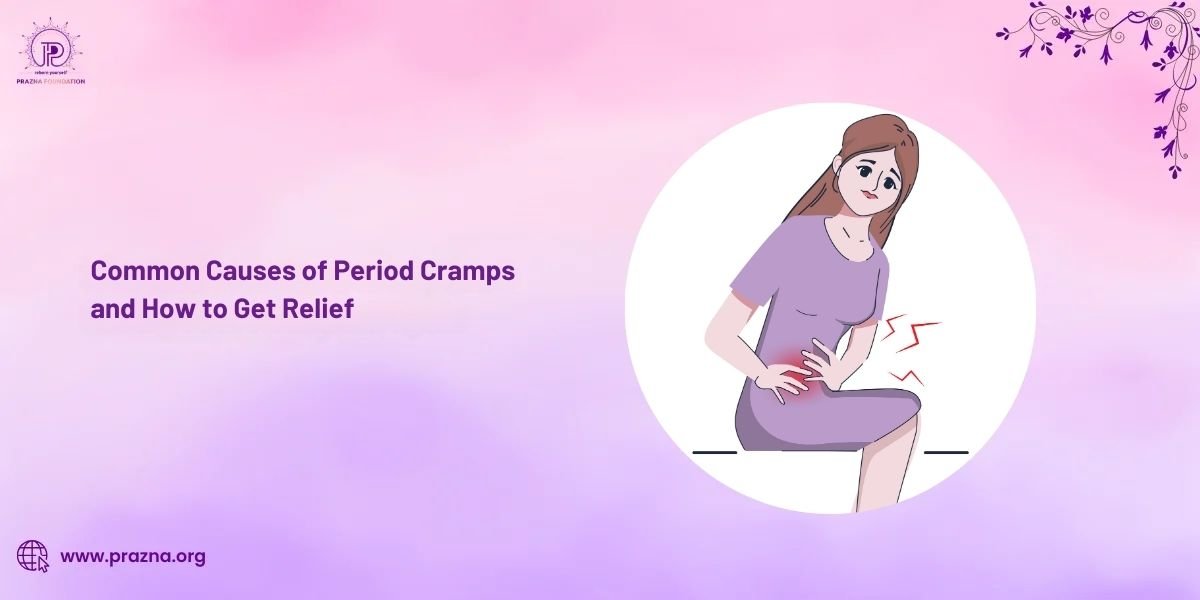Introduction
While period pain affects millions of women internationally, sensations vary from mild discomfort to very unbearable and intense. It is commonly experienced with cramps during the period; towards the end, however, cramps begin to interfere with daily activities such as studies or work. It would be better to know why they occur and how to stop them in order to ensure more well being for women. The blog discusses the common causes of menstrual cramps and how to relieve them along with the importance of menstrual hygiene.
Common Causes of Period Cramps
1. Uterine Contractions
Period cramps are mainly caused by uterine contractions. Menstrual pain happens when the uterus tightens and releases its lining. Any increase in the intensity of these contractions causes the blood vessels to be constricted, leading to pain in the lower abdomen and lower back.
2. Hormonal Changes
Prostaglandins act somewhat like hormones and are very important in the intensity of symptoms of menstrual cramps. In simple terms, more prostaglandins lead to stronger contractions and increased pain. Women who exist naturally with higher levels of prostaglandins are usually the ones who suffer severe cramps.
3. Medical Conditions
In some extreme instances of dysmenorrhea, it can be inseparable from or related to some pathological conditions like endometriosis, fibroids, pelvic inflammatory disease, or adenomyosis. Hence, abnormal cramps are those which become so severe as to obstruct daily activities and begin to spawn other symptoms, such as fever, chills, vomiting, or even diarrhea, so that medical attention must be sought.
4. Lifestyle Changes
If your diet is not on point and you hardly work out, while sustaining dehydration, smoking, or perhaps high stress, then your cramps will only become worse. Whenever you do not eat irregularly, caffeine, junk food, risk being two of the worst triggers for additional discomfort during menstruation.
Ways of Treating Period Cramps
1. Heat Application
When heat are being generated on the belly, a warming pad or hot water bottle shall soothe uterine muscles, then through enhanced blood flow.
2. Gentle Exercise and Yoga
Step out for a walk, stretch, do some gentle yoga, renew the inner flow of endorphins, our body’s own painkillers. Abdominal cramps might be eased with the child pose or cobra pose.
3. Balanced Diet Proper Hydration
Certain foods promote inflammation, where anti-inflammation is incomplete-nutrient dense grain foods, along with yellow vegetables-while others may be whole grain.
4. Analgesics for Pain Relief
Ibuprofen or acetaminophen, which are example of some pain-relief medicine, may also cut down the pain effectively. At least, it is prudent to consult a doctor when one finds it worthwhile to take medicines regularly.
5. Getting a grip on stress
Stress can trigger painful period cramps; hence, stress reduction has become a target. Stress gets reduced by meditations, deep breathing exercises, or through simply listening to some calming music.
6. Medical Consultation
If the pain is severe and continuous, then the doctor must be consulted. These diagnostic services help ensure no underlying condition is being ignored.
Conclusion
Menstrual cramps are natural, but men should not interfere with girls going about their day. When home wrangling and lifestyle changes do not work, in some cases, women can require professional assistance for their alleviation. At the same time, it doesn’t do any good to discuss menstruation or menstrual hygiene to facilitate the normalization of this natural function. A women empowerment ngo can promote awareness so that women and girls get the support they need for better health and dignity.
FAQs
1. Tell me, why do period cramps occur every month?
They occur whenever the uterus contracts to push the lining of the uterus out during menstruation, causing pain and discomfort.
2. Does all woman gets period cramps?
Mild cramps might be considered normal. Strong or nonstop cramps might be a sign of a health issue.
3. Would working out help relieve period pains?
Yes. Gentle exercise might help ease the sensations, for endorphins are natural painkillers.
4. What should I avoid during my period?
Avoid things that would cause bloating and cramps. Don’t eat salt, processed foods, and caffeine.
5. When should I visit a doctor for period pain?
If there is a sudden worsening from usual cramps, longer duration than normal and cannot go on with normal daily activities, then it is best that you seek your doctor.
Also read: Why Are Girls Getting Periods Earlier? Causes, Effects and Support









